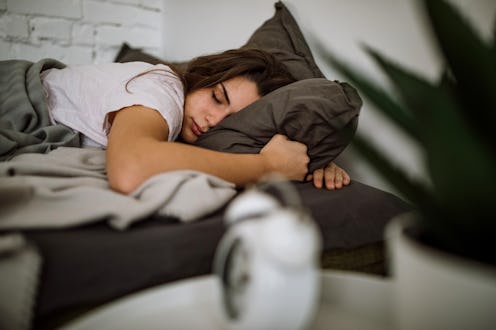Life
How To Get To Bed On Time Every Night

Our bodies are adept at producing cues to let us know when we're tired and when we should go to sleep — but that strange temptation to delay rest also comes easily to many of us. Ostensibly we all know how to get to bed on time every night — that is, we usually know what time we're supposed to be hitting the hay in order to get enough sleep to function the next day — but "bedtime procrastination," as it's known, is a very real and very strange nighttime affliction that can't really be explained. Thankfully, though, with a little planning and a few tricks up your sleeve, actually going to bed when you need to can, in fact, be accomplished. It might just take a little work on your part — and occasionally a little help from your friends.
The term "bedtime procrastination," which describes the habit of putting off going to bed for no real reason, was first coined by scientists at Utrecht University in the Netherlands. In a 2014 study, researchers analyzed the sleep patterns, lifestyles, and tendencies to procrastinate before bed of 177 participants. Lead scientist and sleep expert Dr. Kroese told the Huffington Post of their findings, "People who generally have trouble resisting temptations and adhering to their intentions are also more likely to delay going to bed." In other words, if your willpower is pretty poor in general, you're going to find it hard to stick to a sleep schedule.
But is a rigid bedtime routine the best way to make sure you get some shut-eye, anyway? Well according to behavioral scientist Dan Ariely, there may be other ways to induce sleep if it doesn't come easy to you. Answering one reader's question in the Wall Street Journal about how to enforce your own bedtime when the temptation to fall asleep on the couch instead is just too great, Ariely writes that while good sleep hygiene is definitely imperative, you can also turn to a friend: Enlisting the help of friends or family who can act as your "sleep cop" might help you make sure you actually turn the light out on time. And even if you live alone, you can still try this trick: Ariely recommends swapping pajama photos with your sleep cop at the same time each night to nudge your brain into recognizing that it's time for bed.
This sleep buddy system is definitely one of the more innovative methods of trying to induce sleep if you find it hard to switch off; indeed, as Cari Romm pointed out over at Science of Us, the buddy system has been shown to work for exercise, so why not for sleep strategies, as well? Having someone else to keep you accountable really does help, no matter what goal you're trying to accomplish.
What's more, sleep hygiene has been written about extensively by many experts if you need other ideas, too. The National Sleep Foundation defines good sleep hygiene as "a variety of different practices that are necessary to have normal, quality nighttime sleep and full daytime alertness." Here are a few other ways you can train yourself to go to bed on time every night:
Establish A Bedtime Routine
Whether it's a cup of hot cocoa at the same time each night, or a text from your sleep buddy, setting a regular bedtime routine is the best way to train your mind into recognizing when it's time for bed.
Avoid Exposure To Bright Light Before Bed
Sleep expert Glenn Landry told CBC that too much light exposure at night messes with our body's internal clock, which regulates our natural sleep rhythm. We have artificial sources of light available to us 24 hours a day," said Landry. "We've got our laptops with us, and we're doing email and we're watching TV late at night. And so we're getting light at night, [which] impacts our circadian rhythms, our daily biological rhythms." So switching to night mode (or even better, switching our devices off hours before bed) will help our mind settle down.
Don't Bring Your Problems To Bed
Want a good night's kip? Well, try and go to bed happy — or at least not actively upset. (I know — easier said than done, right?) The National Sleep Foundation recommends avoiding "emotionally upsetting conversations and activities before trying to go to sleep. Don't dwell on, or bring your problems to bed," they advise. Exactly which strategies for calming down when you're upset work will obviously vary from person to person, but here are a few places to start.
Avoid Alcohol Close To Bedtime
Food, nicotine, and alcohol all interfere with your sleep cycle, but alcohol in particular speeds up the onset of sleep at first, then skips the second stages of your slumber altogether when your body metabolizes the alcohol — resulting in some majorly unrestful snoozing. "Deep sleep is when the body restores itself, and alcohol can interfere with this," explains Dr. John Shneerson to Drink Aware. "As the alcohol starts to wear off, your body can come out of deep sleep and back into REM sleep, which is much easier to wake from. That's why you often wake up after just a few hours sleep when you've been drinking."
Exercise
Moving around more before you hit the sack can be a great way to induce a deep sleep. But finish your workout at at least three hours before bed so you're not over-stimulated when you finally head to bed.
Sleep well, friends!
Images: StefaNikolic/E+/Getty Images; Giphy (5)